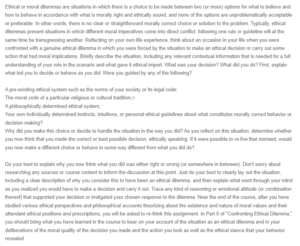Confronting Ethical Dilemmas – Doing the Right Thing
I was responsible for monitoring my colleagues’ internet activity and reporting my findings to the head office while working as a part-time administrator in a local company. The action was informed by the growing concerns that employees were visiting non-work-related websites and spending significant time on those websites. Such habits led to unproductivity leading to losses in terms of dollars. Among others, I was required to check whether some employees used their free time for freelance work. I was faced with the option of complying with the instructions from the head office or secretly tracking my colleagues’ internet activity.
The situation presented an ethical dilemma on various fronts. Firstly, I felt that secretly monitoring my colleagues’ internet activity without their prior knowledge would invade their privacy. Besides, I thought the move to monitor internet activities by some of my colleagues was utterly unkind. This is based on the fact that some of them are low-level employees who are not remunerated well, making the workplace internet a perfect source alternative to carrying out some of their private tasks. These conflicting interests partly made me side with the employees.
On the other hand, I also understood the employer’s desire to monitor workplace internet activity. The first apparent reason is that employees should be productive while using company resources. Also, there are concerns that employees may use workplace resources to do unethical or illegal activities, which may ruin the company’s image. I feel that the employer’s decision to monitor internet activity was justified. However, there was no policy elaborating whether or not the employees were to expect any form of privacy.
Faced with this ethical dilemma, I decided not to comply with the employer’s instructions and instead gave employees a clean bill of health. The decision was based on a legal code that grants employees the right to privacy (Rosenstand, 2020). If I were to monitor and report their internet activity, I felt some employees would feel I was spying on them. I would have complied readily if there was a clear policy outlining such monitoring, or at least if the employer was to require me to monitor specific communication or website visits.
References
Rosenstand, N. (2020). The moral of the story: an introduction to ethics. Mcgraw-Hill Education.
ORDER A PLAGIARISM-FREE PAPER HERE
We’ll write everything from scratch
Question
Ethical or moral dilemmas are situations in which there is a choice to be made between two (or more) options for what to believe and how to behave in accordance with what is morally right and ethically sound, and none of the options are unproblematically acceptable or preferable. In other words, there is no clear or straightforward morally correct choice or solution to the problem. Typically, ethical dilemmas present situations in which different moral imperatives come into direct conflict: following one rule or guideline will at the same time be transgressing another. Reflecting on your own life experience, think about an occasion in your life when you were confronted with a genuine ethical dilemma in which you were forced by the situation to make an ethical decision or carry out some action that had moral implications. Briefly describe the situation, including any relevant contextual information that is needed for a full understanding of your role in the scenario and what gave it ethical import. What was your decision? What did you do? First, explain what led you to decide or behave as you did: Were you guided by any of the following?

Confronting Ethical Dilemmas – Doing the Right Thing
A pre-existing ethical system such as the norms of your society or its legal code;
The moral code of a particular religious or cultural tradition;>
A philosophically determined ethical system;
Your own individually determined instincts, intuitions, or personal ethical guidelines about what constitutes morally correct behavior or decision making?
Why did you make this choice or decide to handle the situation in the way you did? As you reflect on this situation, determine whether you now think that you made the correct or best possible decision, ethically speaking. If it were possible to re-live that moment, would you now make a different choice or behave in some way different from what you did do?
Do your best to explain why you now think what you did was either right or wrong (or somewhere in between). Don’t worry about researching any sources or course content to inform the discussion at this point. Just do your best to clearly lay out the situation, including a clear description of why you consider this to have been an ethical dilemma, and then explain what went through your mind as you realized you would have to make a decision and carry it out. Trace any kind of reasoning or emotional attitude (or combination thereof) that supported your decision or instigated your chosen response to the dilemma. Near the end of the course, after you have studied various ethical perspectives and philosophical accounts theorizing about the existence and nature of moral values and their attendant ethical positions and prescriptions, you will be asked to re-think this assignment. In Part II of “Confronting Ethical Dilemma,” you should bring what you have learned in the course to bear on your account of the situation as an ethical dilemma and in your deliberations of the moral quality of the decision you made and the action you took as well as the ethical stance that your behavior revealed.

